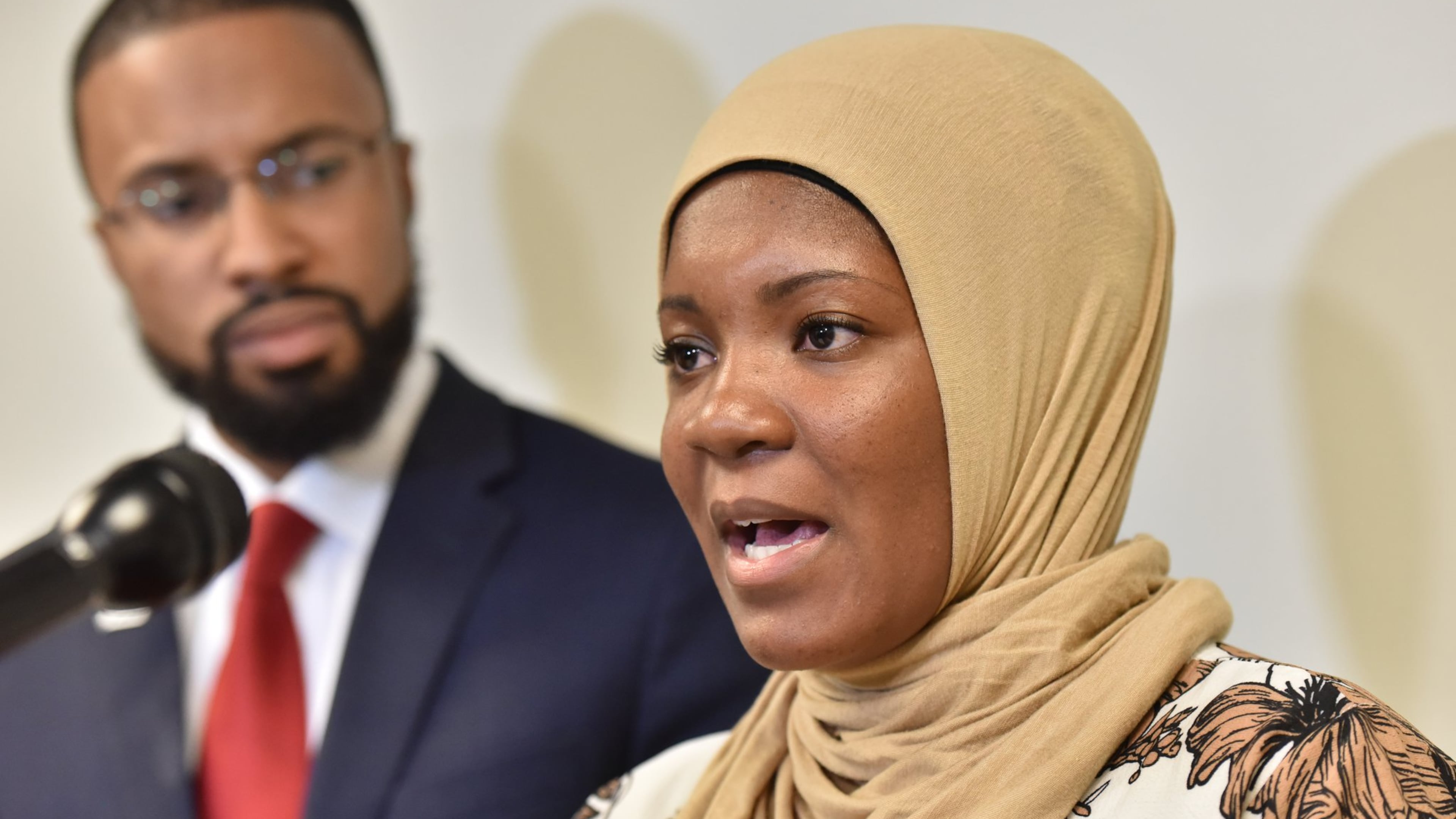Muslim woman says Ga. Corrections Department won’t let her wear hijab

A Muslim woman has filed a discrimination complaint against the Georgia Department of Corrections, alleging the agency violated her religious beliefs by not allowing her to wear a hijab at work.
In the complaint filed with the Georgia Commission on Equal Opportunity, Jalanda Calhoun, a 25-year-old corrections officer at Rogers State Prison in Reidsville and a recent convert to Islam, says she told her supervisors earlier this year that she would start wearing the hijab, a scarf that would cover her hair, ears and neck, and asked to be able to take a 10-minute break to pray.
"Both my job and my religion are very important to me," said Calhoun, who lives in Tattnall County, where the all-male prison is located. "I never thought I would have to choose between" the two.
She said she knows what “God has asked me to do and what the U.S. Constitution allows me to do. My hope is that as a government agency, the Georgia Department of Corrections will do the right thing.”
» RELATED: Muslims in America, by the numbers
When Calhoun, who has worked for the Corrections Department for three years, first started wearing the hijab, she got a few “funny” stares and inappropriate comments, but no one asked her to remove her hijab until a month later.
Calhoun recently discussed her experience during a news conference at CAIR-Georgia offices in Atlanta. CAIR (also known as the Council on American-Islamic Relations) is a Muslim civil rights and advocacy organization. Standing with her in solidarity were the Rev. Corey Brown, of the Bridge Interfaith Alliance; Gulbarg Singh “Gogi” Basi, from the Sikh community; and Azadeh Shahshahani, legal and advocacy director for Project South.
“If you are a Muslim woman who wears a hijab, a Sikh man who wears a turban, an Orthodox Jew who wears a kippah or a Catholic nun who wears a habit, you can serve in the U.S. military while wearing your religious clothing,” said Edward Ahmed Mitchell, executive director of CAIR-Georgia. ” You can patrol the streets of the city as a police officer. You can perform heart surgery. You can fly a plane. You can do any number of things, but according to the state of Georgia, you cannot wear your religious clothing while you work in the Department of Corrections.”
Then, at the end of February, Calhoun received a letter from Warden Linton Deloach advising that regulations allowed her to wear a cap issued by the department, a non-Department of Corrections cap bearing the agency’s logo or emblem or a blue or black toboggan.
Otherwise, the “head coverings that you have asked to wear do not conform” to standards.
Deloach cited several safety concerns, including the ability to readily identify her as a GDC employee “while wearing alternative headwear.” He also said contraband could be easily concealed in such a garment or that “alternative headwear” could be used by an inmate to conceal his identity in an attempt to escape.
Such reasoning, said Mitchell, “makes no sense,” in part because her face would still be visible.
According to Mitchell, prison officials said they could not set aside time for Calhoun to pray because they were understaffed.
One of the tenets of Islam requires Muslims to pray five times a day. With her schedule, Calhoun would have to pray once during her shift.
» RELATED: 5 things you should know about Ramadan, Islam's holy month of fasting
On April 29, CAIR-Georgia sent a letter to Gov. Brian Kemp asking him to intervene.
Mitchell said the governor is known as a strong defender of the First Amendment and religious liberty and the organization asked that he issue a directive ordering all state agencies to allow employees to wear symbols of their faith.
Cody Hall, a spokesman for Kemp’s office, said press questions are being referred to the Georgia Department of Corrections. The Corrections Department could not be reached for comment.
CAIR’s Mitchell said the issue, at one point, came close to a resolution. Calhoun was told she could wear a cap and a turtleneck but could not cover her earlobes. If a resolution is not reached, he said, the matter could go to the Equal Employment Opportunity Commission.
Shahshahani called such practices “discriminatory.”
“Project South rejects any attempt to demonize or stigmatize the Muslim community,” she said. That includes a policy that in effect prohibits employees like Calhoun from practicing her religion and wearing the hijab. Project South is a social justice organization focused on social, economic and political issues in the South.
Before the hijab issue arose, Calhoun said she was treated like everyone else.
“I just feel uncomfortable because I’m so used to being covered,” she said. “When I’m not covered, it makes me feel naked or something. I just feel uncomfortable.”
Calhoun hopes to stay at the Department of Corrections.
In fact, she says she loves her job.
“I just don’t like how they disrespected me and disrespected my religion the way they did.”

